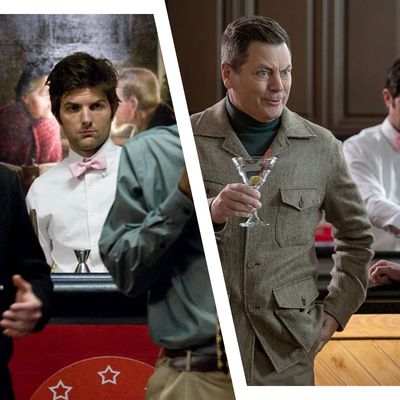
In Vulture’s review of season three of Starz’s Party Down, critic Kathryn VanArendonk wrote that the revival benefited from the 13-year interval following the show’s cancellation in 2010. Time, she reasoned, has “only improved its ability to take on the themes it wanted to explore in the first place.” Fundamentally, the show remains the same: a glimpse at the dispiriting lives of a group of show-business aspirants through the various events they work as caterers in Los Angeles. Its new episodes, most notably “First Annual PI2A Symposium,” function almost like controls that contextualize how much the world around the show has changed. In that episode, the Party Down crew is hired to cater a conference organized by a group of right-wing ideologues, rehashing a premise it previously used in the season-one episode “California College Conservative Union Caucus.” The primary difference? In 2009, the show’s conservative characters were a group of well-intentioned if misguided people who believed in a meritocratic America. In 2023, they are — for lack of a better term — Nazis.
Beyond their premises, the two episodes share a number of overlapping story beats that create the impression of deliberate homage. Both episodes feature a celebrity who is supposed to make an appearance at the conference but cancels at the last second. Both see Ryan Hansen’s character Kyle performatively act out against a perceived injustice, only to have his protests backfire. In 2009, a conference attendee uses the term “PC police”; in 2023, one pejoratively uses the word “woke.” The extent to which these beats are heightened, however, offers commentary on the extreme turn America’s political climate has taken in the ensuing years. In “PI2A,” Calum Worthy and Nick Offerman play members of a think tank called “Policy Ideas To Action” who butt heads over how much to reference Hitler’s Germany in the organization’s messaging for the sake of “optics.” Worthy’s character, Stuart, stages a fake protest of the event to drum up online buzz, only to have real counterprotesters show up and fight them.
Given the direct line between these episodes, it’s fitting that the credited writer of both is Party Down co-creator John Enbom, who recently spoke to Vulture about what went into crafting this spiritual sequel, the changing nature of American conservative politics, and the show’s general approach to satire.
Did you intentionally set out to make “First Annual PI2A Symposium” a sequel to “California College Conservative Union Caucus”?
You’re definitely correct that there is a weird echo and evolution there. But I don’t think it was intentional. With the episode in the first season, it was very specifically set up as a foil to the mental place Henry was in. He was meeting these very bootstrap, “make your own destiny,” bright-eyed type of Reagan conservatives. It was a deliberate gesture to put him in contrast to that group of folks. This go-around, we were looking for something that would put these people exactly where they didn’t want to be. We wanted this to be the real nadir of Ron’s desperate attempts to keep the company afloat by any means necessary. What is the one place they would feel like they were being forced into a situation they really didn’t want to engage with? The echo just kind of happened.
In 2009, if you’d had those Reagan conservatives associate themselves with Nazis, it might have seemed a little heavy-handed. In the climate today, it sadly doesn’t feel out of place. How did you think about establishing parameters for the satire this time around?
This kind of conservative philosophy has evolved over the years, and what it looks like in the cultural landscape is very different now. It’s funny to think back to the more innocent times. We were just like, “Look, it’s these little blue-blazer Republicans.” It seems so quaint. We were breaking this like a year and a half ago, and at the time, we were like, “Does this seem overly broad or cartoonish?”
What were some of the things you decided were too outlandish?
Because the episode is about these people being in a situation they deeply don’t want to be in, we started out being like, “We’ll make these characters outlandishly horrendous.” A lot of the stuff that got cut was the idea that these guys were always trying to have a “free speech” debate on these subjects all the time. There were a lot of scenes we didn’t have time for, of these people trying to engage others in outlandish conversations of, “Let’s really debate whether or not you wouldn’t be better off living in a fascist state,” and they’re like, “I just want to serve you chicken.”
One of the conservative tropes you built on from the 2009 episode is the idea that all you need to do to get ahead in life is work hard. In this episode, we see Roman has a popular vlog, but he’s still working as a caterer. We see Sackson has a brand deal, but he’s still working as a caterer. Was this your way of saying this narrative still exists but that the goalpost has moved?
When we were thinking of doing this 12 years later, one of the reasons we were confident the show remained relevant was because we felt like that exact question is more ubiquitous than ever. Twelve years ago, these guys were basically gig workers before there was a name for it. That whole mind-set of “you’ve got to hustle and grind on your side hustle to make it your main hustle” is describing something we were feeling around back in the day. The world hasn’t changed away from what we were doing. It’s moved harder into it.
You introduce the idea of Roman’s vlog, and pretty soon afterwards, Sackson points out that the type of people who watch it are not dissimilar to the people attending this conference: Nazis and incels. Would you say Roman is an incel?
When we were talking about where we would find him 12 years later, we were having that conversation, because the way we’d portrayed him in the original seasons definitely had elements of that disgruntled, resentful nerd persona. As the years went by, we watched GamerGate unfold. All of these worlds that seemed like he would be a part of started curdling in weird ways. That’s where the idea of his vlog came from. We had lofty goals that we were going to have an episode where we’d get to see what his vlog is like and see him have conversations that would speak to these weird little subcultures that have bubbled up since we originally came up with Roman. But at the same time, I think we always feel like he’s too gentle-hearted of a person to ever get that mean.
What were the inspirations for Calum Worthy’s character, Stuart? Is he a facsimile of any real-life figures?
There are definitely some articles that have come out in the past year or so that talked a lot about this new “intelligentsia” of this very different kind of conservatism. We were looking at these people in their 20s who are making names for themselves as the new conservative voice of whatever. A lot of them were very “academic” in their approach to stuff. They had this thoughtful persona, and they referred to a lot of “philosophical touchstones.” It’s not just a libertarian, Reagan-esque, free-market, free-speech type thing. But one phrase kept popping up everywhere: “Are you afraid of open debate?” “Let’s just have the debate.” That was one of the things we wanted everyone to be incredibly annoyed by. Because it was never a debate. It was always just a chance for these guys to pounce on them.
How did the idea to have Stuart fake a protest become part of the episode?
We saw it a lot over the last couple of years with all the protests in various cities. There are people who have different axes to grind reporting on stuff from totally different perspectives. Everyone is battling in every mode of media they can bring into the fight. In breaking the story, we thought, “What if they use this as a clever false flag to get attention, but it backfires on them?” It was very much in our minds when we were talking about these kinds of politically engaged and pugnacious groups: They’re out there doing whatever they can to not only get attention for themselves but also force a narrative on everything.
Having had the chance to see all the ways political satire has failed and succeeded in the years since Party Down first went off the air, is there anything you wanted to steer away from or lean into?
We’ve tended to veer away from what you would call “straight satire,” because I’m not sure we would call ourselves so knowledgeable that we’re able to be really precise in that regard. For instance, I don’t know if you would call Veep strictly satire, but it was definitely satirical, and they had a really terrific take on that world that spoke to how everybody behaved. But when we’re popping into these little worlds, we often don’t have the ability to go deep enough to really do a satirical treatment that feels meaningful as opposed to just superficially make fun of them in a drive-by sense. If you really want to tee off on some of these more outrageous fringe characters, you can certainly do it, but it’s not going to be anything more than just, “Get a load of these weirdos.” We always want to be dealing with who these people are, what they want, and how that reflects what our people are dealing with in their lives. In that sense, going on this little ride with Calum’s character felt like it spoke to him as a character as opposed to the faux Nazis in general. I consider really good “Satire with a capital S” pretty hard to do, so we always try to come at it from the sides.
This interview has been edited and condensed for clarity.


